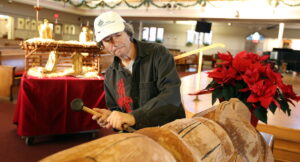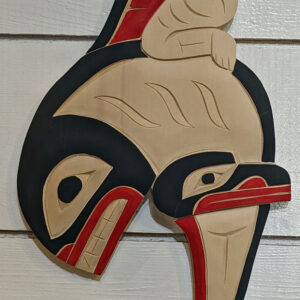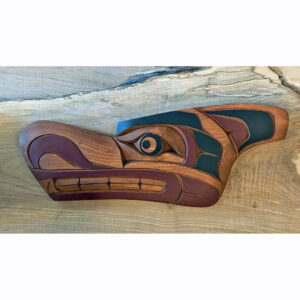First Nations Kwakiulth Star Mask
$6,500.00
This powerful Kwakiulth Star Mask was carved by the late Tony Hunt, Jr. We are very honored to present this piece.
The carving and painting is immaculate. This piece measures 32 x 23.5 and is 6 inches thick. Priced at $6500.
Tony Hunt Jr., a Kwaguilth artist and dancer, was born December 4th 1961 in Victoria, British Columbia. Tragically, he passed away after an illness at age 55 in 2017. He is a member of the Hunt family of Fort Rupert that includes many artists such as his father Tony Hunt Sr., his great-grandfather Mungo Martin, and his uncles Richard and Stan Hunt.

Tony began carving at an early age. While in his senior years in high school a special program was put in place enabling him to spend half his time on academics and half carving at the Arts Of The Raven workshop under the direction of his father.
As an initiated Hamatsa, Tony regularly danced at potlaches. His work reflects a family tradition that traces back to his grandfather Henry Hunt and his great grandfather Mungo Martin. Tony spent his life learning the Kwaguilth art form from his elders and contemporaries. His images are traditional but contain elements of his own creativity.
Today Tony’s work is sought after by collectors all around the world. His work was part of the exhibition “Chiefly Feasts”, that was shown at the Royal Museum Of British Columbia and The Burke museum in Seattle and has toured the world.
Please view Tony Hunt, Jr’s obituary in the Times Colonist.com to learn more about his life and his amazing legacy.
The Kwakwaka’wakw are well-known for their masks and totem poles, which depict animals and supernatural beings. Masks are an integral part dances and the stories they tell. The totem pole is a record of family history. Today’s artists have revived the arts of carving masks and totem poles as well as canoe building and Chilkat weaving. Carving is considered a man’s art, while weaving is done by women. The Chilkat technique involves weaving wool with twine made from cedar bark to make robes, aprons, skirts, and leggings. (thank you bigorrin.org)
The Kwakwaka’wakw (kwa-kwa-ka-wak) includes several nations and tribes. The Kwakiutl are the most famous of the Kwakwaka’wakw nations because of the research by Franz Boas. They have reserves in northwestern British Columbia with a higher population on Vancouver Island, a biologically diverse coastal area that includes temperate rainforest. Many have migrated away from their villages to have better access to social services.
Kwakwaka’wakw literally means “the people who speak Kwak’wala.” Kwak’wala is a branch of the Wakashan (Wuh-CASH-shun) linguistic family and it has five dialects. Today less 4% of Kwakwaka’wakw speak their native language, but they have created initiatives to revive it through language instruction in primary schools and Kwak’wala literacy programs for children and adults.
According to treaty, the Kwakuitl have hunting, fishing and gathering rights in their traditional territory on Vancouver Island. The government has breached this treaty by giving out land grants. The Kwakiutl First Nation continues to pursue Land Claims in the face of privatization. In 1986 they used nonviolent means to protect Wazulis (Deer Island) from logging. The activists who were occupying the site found ancient burial remains that proved their right to the land and won a court order to repatriate the island (Wonders 2008).
The struggle continues as the Ministry of British Columbia authorized a land transfer in 2007 without consulting the Kwakuitl. The Ministry’s decision allowed Western Forest Products, a logging company that previously held a Tree Farm License in the area, to sell 28,000 hectares of land to developers, including 14,000 hectares that belonged to the Kwakiutl. The following year the Kwakiutl First Nation initiated a lawsuit against the B.C. government for failing to consult them on the land transfer.







